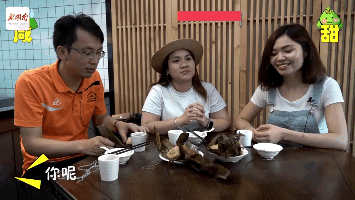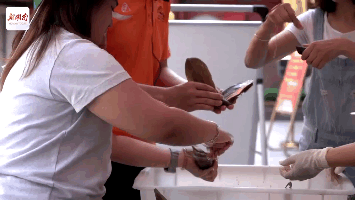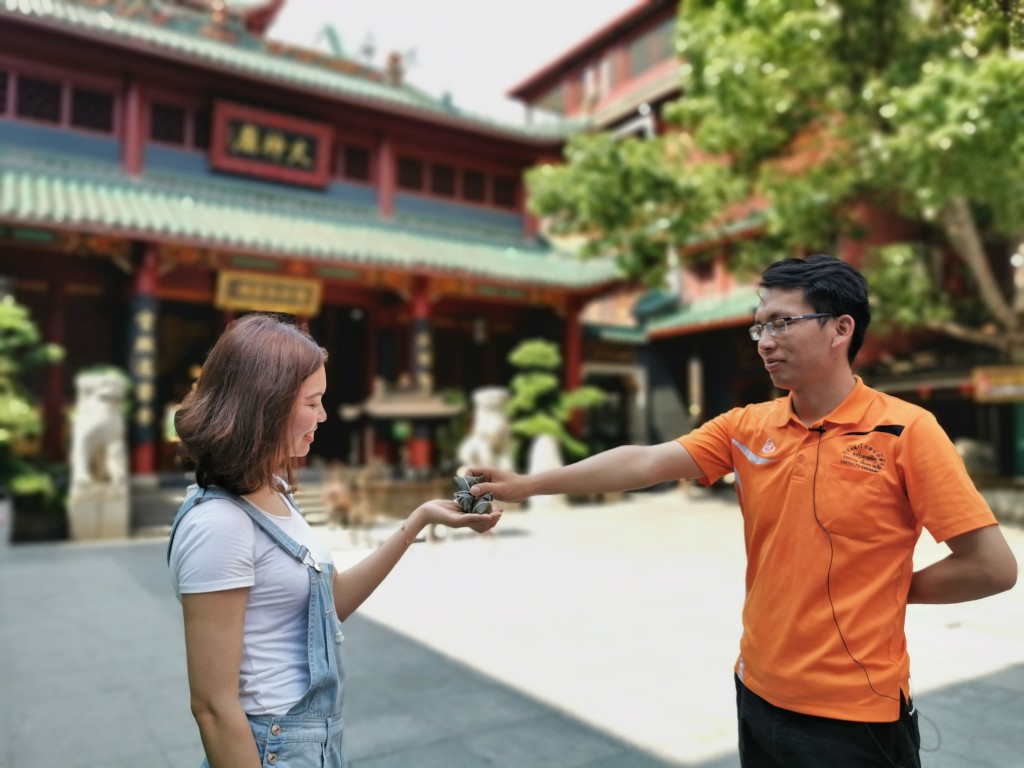新湖南客户端 2019-06-07 09:39:57

新湖南客户端记者 彭可心 周杨 摄影 剪辑 陆薇 李真明
又是一年端午节,这个始于春秋战国时期的中华民族传统节日,至今已有两千多年历史。
如此古老的节日,老外们又了解多少呢?
品湘记第五期,新湖南客户端带领湖南师范大学的三位留学生来到湖南“老字号”——火宫殿,体验传统端午节的“重头戏”——包粽子。
“我知道端午节是纪念屈原的节日。”“我这包粽子的手艺可以回老挝开店了。”老外们你一言我一语地交谈着,他们热情洋溢的端午节体验,开始了!

想把湖南美食带回家乡
“端午节是为了纪念爱国诗人屈原,为了不让江里的鱼咬屈原,大家就向江里丢粽子……”当记者问起关于端午节的来历和吃粽子的缘由,来自越南的黎黄慧香立刻用标准的中文滔滔不绝地说了起来。谁能知道,两年前她还对中文还一窍不通呢?
“我特别喜欢中国的传统文化和音乐,也特别好奇传统节日的由来和一些传说、风俗。”黎黄慧香现就读于湖南师范大学,是一名学习音乐教育的女博士。她每周都要学会一首中文歌,这也是她练习中文的小秘诀。
胡伟斌和陈苏都来自老挝,今年9月,就要开始在湖南师范大学读研一了。一个学习工商管理,一个学习法律。
为何选择湖南留学?陈苏和记者说,听说湖南气候和老挝很像,又热不需要适应期。“来了之后,发现果然很像。”陈苏大笑。
当然,陈苏最感兴趣的,还是湖南的食物。“长沙有很多别的地方吃不到的美食,比如糖油粑粑、奶茶,我想把这些食物,都带回老挝。”

甜党还是咸党?
虽然早就尝过中国传统粽子是啥滋味,但上手包粽子还是头一遭,三个人难免有些手忙脚乱。
黎黄慧香是个“问题宝宝”,一直不停地追问师傅包粽子的窍门。“最难的就是把粽叶包起来,粽子不能包得太紧,也不能过松,要不糯米就会漏出来了。”

胡伟斌一开始包粽子便叫苦不迭,“这比想象中难太多了吧!”但跟着师傅学习了一会儿后,好似掌握了窍门,得意洋洋地向记者炫耀刚包好地粽子,陶醉地说:“我这技术,都能回老挝开店了。”
吃粽子一直都有甜咸之争,不想老外们也分“甜党”“咸党”。
陈苏是坚定的“咸党”,“咸蛋黄和糯米太搭了!”她也很喜欢传统肉粽,觉得又咸又香,“有滋味!”
黎黄慧香则是标准的“甜党”。“甜口粽子好吃,如果我自己包,还要放红豆、绿豆、白糖,再加一点莲子,清香可口!”她还想着,下次回越南过端午节,要包中国的粽子给家人吃。
胡伟斌保持中立,“只要糯米好吃,甜的咸的都好吃。”

粽子,承载着回忆和思念
其实,在越南和老挝也会吃粽子。但不同的是,老挝吃粽子在4月泼水节,而越南则是在春节。
吃着中国传统粽子,陈苏不由想起了家乡的粽子。“老挝的粽子个头小多了。”她用手比划着告诉记者,“馅料也和这边不一样,有黄豆猪肉馅、花生馅,还有香蕉馅呢,切成一片片的,煮得软软的、甜甜的。”

在黎黄慧香的记忆里,外婆包粽子的身影就是春节最温暖的画面。“小时候,妈妈会带我们一起回外婆家过年。每一次,外婆都会在厨房准备好糯米、粽叶等材料,亲手包粽子给我们吃,还老念叨要教我们包。”
融入了真情实感的粽子,味道也越发丰厚起来,成为回忆和思念的重要载体。黎黄慧香希望,像粽子这类的传统食物一定要保留下来。“每次看到粽子,我就会想起外婆。以后我有了孩子,我也要教他们怎么包粽子。”
Dragon Boat Festival is coming soon. How much do foreigners know about such a festival with a history of thousands of years?
We invited three foreign students from Hunan Normal University to celebrate the old festival with us. This time they will learn how to make Zongzi, the Dragon Boat Festival dim sum.
Hunan Cuisine
"The Dragon Boat Festival is to commemorate the patriotic poet Qu Yuan who committed suicide out of love for his country. Local folks dropped rice balls into the river to stop fish from eating his corpse. " Li Huanghui from Vietnam answered in standard mandarin when we asked about the origin of the Dragon Boat Festival and the reason for eating zongzi.
“I really like Chinese traditional culture and music. And I am especially curious about the origin of traditional festivals and some legends and customs.” Li Huanghui is a PhD student in music education at Hunan Normal University.
Hu Weibin and Chen Su are both from Laos. In this September, they will start a new semester at Hunan Normal University. Chen Su said that the climate in Hunan is very similar to that in Laos. That's why he chose Hunan to continue her studies.
Chen Su is interested in Hunan cuisine. “Changsha has a lot of foods that can't be eaten anywhere else, such as sugar tarts and milk tea. I want to bring these foods back to my hometown.”
Sweet or Salty?
Although having tasted zongzi for a long time,the three students don’t have any experience of wrapping zongzi.Thus they are inevitably in a great fuss.
Li Huanghuixiang is “a girl of question”, who keeps asking for the tips on making zongzi."The most difficult step is to wrap up the reed leaves. You can’t wrap them too tight or too loose, otherwise the glutinous rice would leak out."
Hu Weibin can’t help complaining during his work--"That’s much harder than I supposed!" However, after learning from the master for a while,he seems to master the knack and soon shows off his newly wrapped zongzi to the reporters."Now I can even sell zongzi in Laos!" Hu is pretty intoxicated with his skills.
"Sweet or salty" is the eternal debate of eating zongzi. Even the foreigners cannot evade this question.
Chen Su is totally an advocate of salty zongzi, as she says,"Salted yolk and glutinous rice are perfect match!" She also likes the traditional meat zongzi, for it is salty and tasty.
While Li Huanghuixiang is a fan of sweet zongzi. "Sweet zongzi is delicious!If I make it myself, I would like to add some red beans, mung beans,sugar and lotus seed. It would be yummy with delicate fragrance!" She plans to make zongzi for her families on the next Dragon Boat Festival, when she go back to Vietnam. Hu Weibin remained neutral: "As long as glutinous rice tastes good, both sweet and salty zongzi are wonderful."
Zongzi, a symbol of memories and thoughts
In fact, eating zongzi is also a custom in Vietnam and Laos. But the difference is that people in Laos eats zongzi at the Water-Splashing Festival in April, while the Vietnamese eats zongzi at the Spring Festival.
Chinese zongzi reminds Chen Su of the zongzi from her hometown. "Zongzi in Laos is much more smaller." She told reporters the size with her hands, " The flavor is also different. We have soybean and pork stuffing, peanut stuffing and banana stuffing. Bananas are cut into slices, soft and sweet."
In Li Huanghuixiang's memory, Granny’s figure of making zongzi was the warmest image at the Spring Festival."When we were young, mom would take us to grandma’s house at Spring Festival. And grandma would prepare some glutinous rice, reed leaves and other materials in the kitchen, making dumplings for us. She also talked about teaching us."
Zongzi, with love and warmth, becomes more tasty and turns into an important carrier of memories and thoughts.Li Huanghuixiang hopes that traditional foods like zongzi would be preserved by people. "As long as I see zongzi, I will miss my grandmother. When I have children, I will also teach them how to make zongzi."
Translated by Yang, Tang Lelin
责编:彭彭
来源:新湖南客户端

版权作品,未经授权严禁转载。湖湘情怀,党媒立场,登录华声在线官网www.voc.com.cn或“新湖南”客户端,领先一步获取权威资讯。转载须注明来源、原标题、著作者名,不得变更核心内容。
我要问



 下载APP
下载APP 报料
报料 关于
关于
 湘公网安备 43010502000374号
湘公网安备 43010502000374号